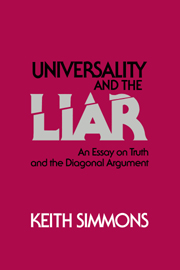Book contents
- Frontmatter
- Contents
- Preface
- Chapter 1 The Liar paradox
- Chapter 2 The diagonal argument
- Chapter 3 The diagonal argument and the Liar, I
- Chapter 4 The diagonal argument and the Liar, II
- Chapter 5 A medieval solution to the Liar
- Chapter 6 A singularity solution to the Liar
- Chapter 7 A formal account of singularities
- Chapter 8 Applications and further singularities
- Chapter 9 Semantic universality
- Notes
- Bibliography
- Index
Chapter 1 - The Liar paradox
Published online by Cambridge University Press: 19 October 2009
- Frontmatter
- Contents
- Preface
- Chapter 1 The Liar paradox
- Chapter 2 The diagonal argument
- Chapter 3 The diagonal argument and the Liar, I
- Chapter 4 The diagonal argument and the Liar, II
- Chapter 5 A medieval solution to the Liar
- Chapter 6 A singularity solution to the Liar
- Chapter 7 A formal account of singularities
- Chapter 8 Applications and further singularities
- Chapter 9 Semantic universality
- Notes
- Bibliography
- Index
Summary
Suppose I say,
I am lying now.
Am I telling the truth, or am I lying? Suppose I'm telling the truth. Then what I say is the case – and so I'm lying. On the other hand, suppose I'm lying. But that's what I say. So I'm telling the truth. Either way, we are landed in contradiction: We are caught in the paradox of the Liar.
We get into the same kind of trouble if I say,
This sentence is false.
If what I say is true, then it's false; and if what I say is false, then it's true. We are confronted with the Liar again, under a slightly different guise.
Here is another version of the Liar, sometimes called the heterological paradox. Some words are true of themselves: For example, the word ‘polysyllabic’, itself a polysyllabic word, is true of itself; and so are the words ‘significant’, ‘common’, and ‘prosaic’. Other words are false of themselves – the word ‘new’, for example, is not itself a new word, and so is false of itself; and so are the words ‘useless’, ‘ambiguous’, and ‘long’. Let's call these words that are false of themselves heterological. But now take the word ‘heterological’ and ask whether it is true of itself or false of itself. If it is true of itself, then it is heterological, and so not true of itself; and if it is false of itself, then it is heterological, and therefore true of itself. And so we have a paradox.
- Type
- Chapter
- Information
- Universality and the LiarAn Essay on Truth and the Diagonal Argument, pp. 1 - 19Publisher: Cambridge University PressPrint publication year: 1993

